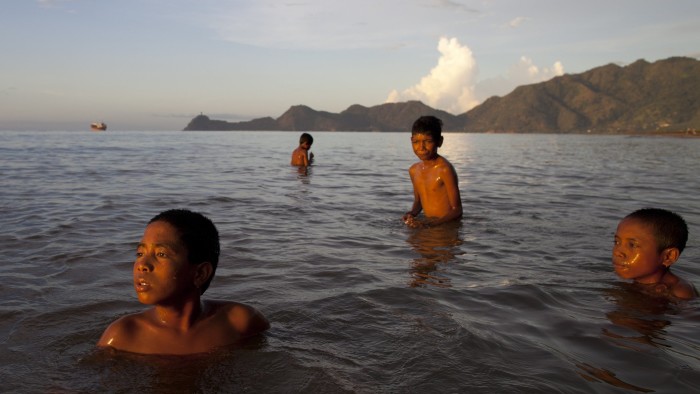Will war on neglected diseases hit target?

Roula Khalaf, Editor of the FT, selects her favourite stories in this weekly newsletter.
Five years ago today, the heads of some of the world’s largest pharmaceutical groups gathered in London with leading health experts, donors and governments to commit to an unusual medicines programme.
In the London Declaration, they pledged to work together rather than compete in an innovative programme, and to donate rather than charge for supplying large volumes of drugs.
Their products were to be used not to treat widespread western illnesses, but instead to work towards the elimination of “neglected tropical disease” infections in poor countries by 2020.
The impact since has been significant. Yet some are nervous that progress may stall given a shift in global priorities and funding under new political and health leaders, and the challenges of tackling the diseases themselves.
“It was a total game changer five years ago,” says Dirk Engels, director of the department of control of Neglected Tropical Diseases (NTDs) at the World Health Organisation. He cites the combination of an NTD “road map with clear goals and deadlines, and the London declaration that rallied all the different multiple diverse partnerships around a single perspective”.

The meeting helped sharply accelerate the volume of drug donations by companies and led them to create a system to help co-ordinate and more efficiently transport supplies from their factories directly to government warehouses in the affected countries.
“Overall the progress has been very good,” says Andy Wright, vice-president for global health programmes at GSK. The British pharma company has scaled up annual free supplies of its medicine albendazole from 709m tablets to over 1bn since 2012 — at a cost to the company he puts at “several tens of millions” of pounds each year.
The drug, distributed through governments and community volunteers, kills the parasites that cause lymphatic filariasis (commonly known as elephantiasis). The result has been a sharp drop in reported cases of the debilitating disease. Global Burden of Disease data show the number of cases of lymphatic filariasis dropped from an estimated 50m in 2010 to 38m in 2015.
Sharp falls have also been reported for onchocerciasis (river blindness) and trachoma (which can also cause blindness) — both helped by the mass drug administration programmes.

Yet there are mixed results for some of the other NTDs identified in the original WHO road map. “It’s been a global health whack-a-mole,” says Peter Hotez, dean of the National School of Tropical Medicine at Baylor College of Medicine in Houston, Texas. “There have been some real success stories, while others have been more modest.”
That partly reflects the different nature of the diseases, not all of which are so easy to tackle through the “chemo-prevention” strategy of prophylactic drug use to prevent and control infection. For most of the conditions, there is a need for accompanying initiatives to develop new drugs and associated diagnostics, and to reduce the risk from the worms, insects and other “vectors” that carry the diseases.
For instance, doctors have raised concerns over obstacles to the eradication of Guinea worm, for which there are just a few human cases now reported each year. The worm has been identified in dogs, notably in Chad, adding fresh complexity to the control of its spread.

Sanitation, education and diagnostic tools are as essential as drugs in fight to control NTDs
Most of those who suffer from NTDs live in the most remote and poorly developed regions of relatively rich middle income countries such as Nigeria. Tackling the diseases effectively will also require far wider economic and social development, including improved hygiene, sanitation and education, experts argue.
Bruno Gryseels, director of the Institute of Tropical Medicine in Antwerp, cautions: “The main question is sustainability, including integrating treatment into regular health systems. That’s a very long-term effort, in countries with very weak health infrastructure.”
Such broader efforts will require greater political and financial commitment from the countries with a heavy disease burden. That is especially true given a global economic slowdown and nationalistic tendencies in some donor countries affecting the UK’s Department for International Development and US aid programmes under President Donald Trump.
“This will be a rough time,” says Prof Hotez. “We have to recognise that between Brexit and Trump, we cannot assume that the US and UK governments will be in this forever.”
The World Health Organisation itself, which championed efforts to eradicate NTDs under Margaret Chan, the agency’s current director-general, will also be under funding pressure and subject to new priorities when her replacement is chosen in May.
When Ms Chan takes stock of progress at a special valedictory meeting in Geneva this April, all those involved in tackling NTDs will be keen for indications that the three shortlisted candidates to succeed her will not neglect them.
But at least for now, many of the drug companies remain willing to continue their support through drug donations. “We’ve committed to supply albendazole till the elimination of lymphatic filariasis globally,” says Mr Wright. “We agreed to donate it for intestinal worms till 2020 and we are looking beyond that. I will advocate that we carry on.”
Comments